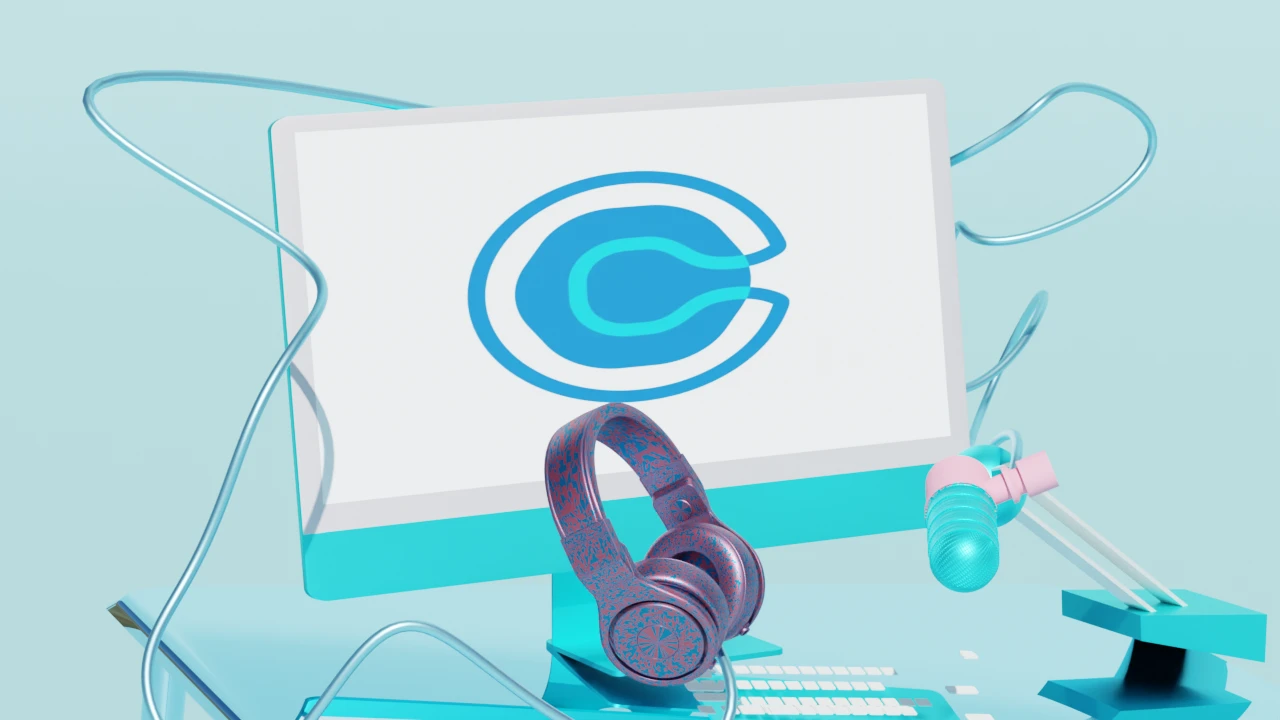There are many things you need to start a podcast: a mic, headphones, and a penchant for Athletic Greens. One thing you’ll definitely need is podcast recording software, the technology that captures audio for your podcast.
There are tons of podcast recording tools to choose from, each promising different features, pricing plans, and use cases.
If you’re overwhelmed with your choices, you’re in the right place. This guide runs through 11 of the best podcast recording software options for any type of creator, from newbies hosting their first episode to experienced podcasters.
The 11 best podcast recording software options
- Descript
- Adobe Audition
- Audacity
- GarageBand
- REAPER
- Zoom
- Logic Pro
- SquadCast
- Alitu
- Riverside
- Zencastr
1. Descript
Best for: Creators who want to record (including remote recording) and edit their podcast within a single tool.
Descript is an AI-powered podcasting suite designed to help creators record, edit, and fine-tune their podcast from a single dashboard. It’s trusted by thousands of creators and some of the world’s top podcasts, including How I Built This, Planet Money, and Conan O’Brien Needs a Friend.
Advantages and standout features:
- Free recording software has everything you need to record and edit audio
- Allows you to write podcast scripts in the tool to keep you on track while recording
- Remote recording in 4K (ideal if you’re podcasting with a guest)
- Video recording for your screen, webcam, or third-party camera alongside audio
- Automatic transcription as you talk, so you can clean up podcast audio in real-time
- Jam-packed with AI features like Filler Word Removal, Studio Sound, and AI Voices
- Social Post Writer to save time when marketing your show
- Rated 4.5 out of 5 stars on G2
Disadvantages of Descript’s podcast recording software:
- No app for mobile recording—just a Mac, Windows, and browser option
- You’ll need a strong internet connection for full functionality
Pricing: Descript has a free plan that includes all premium podcasting features. Start a trial today.
2. Adobe Audition
Best for: Advanced creators already using the Adobe Creative Cloud.
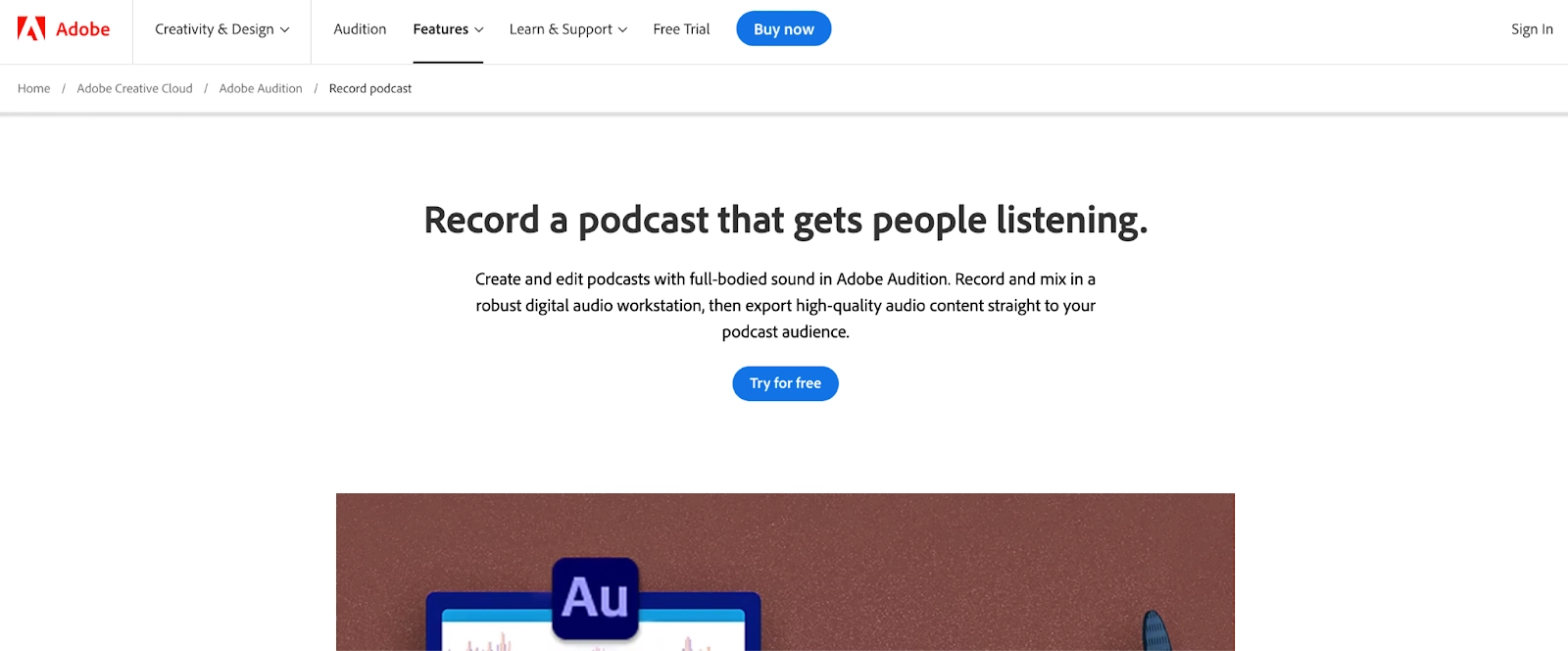 |
Adobe is a brand built for professionals. Audition, its podcast recording software, is no different. You’ll get access to high-quality audio recording features, which is great if you’re a seasoned podcaster that needs something reliable and professional grade. But newbies might find the recording software has a steeper learning curve than alternatives on this list.
Advantages and standout features:
- Included as part of the Adobe Creative Cloud
- Noise reduction tools to cut background noise
- Remixing features to change the order of clips, adjust audio levels, and insert music
- Non-destructive multitrack editing tools for maximum flexibility
- Rated 4.5 out of 5 stars on G2
Disadvantages of Adobe’s podcast recording software:
- More expensive than many other audio recording software options
- Advanced features can make it difficult for beginners
Pricing: Standalone access to Adobe Audition is $22.99 per month. You can get Audition alongside 20+ other tools in the Creative Cloud for $59.99 per month.
3. [Removed Listing]
This option has been removed from our list.
Best for: Beginner podcasters who want to customize their recording software.
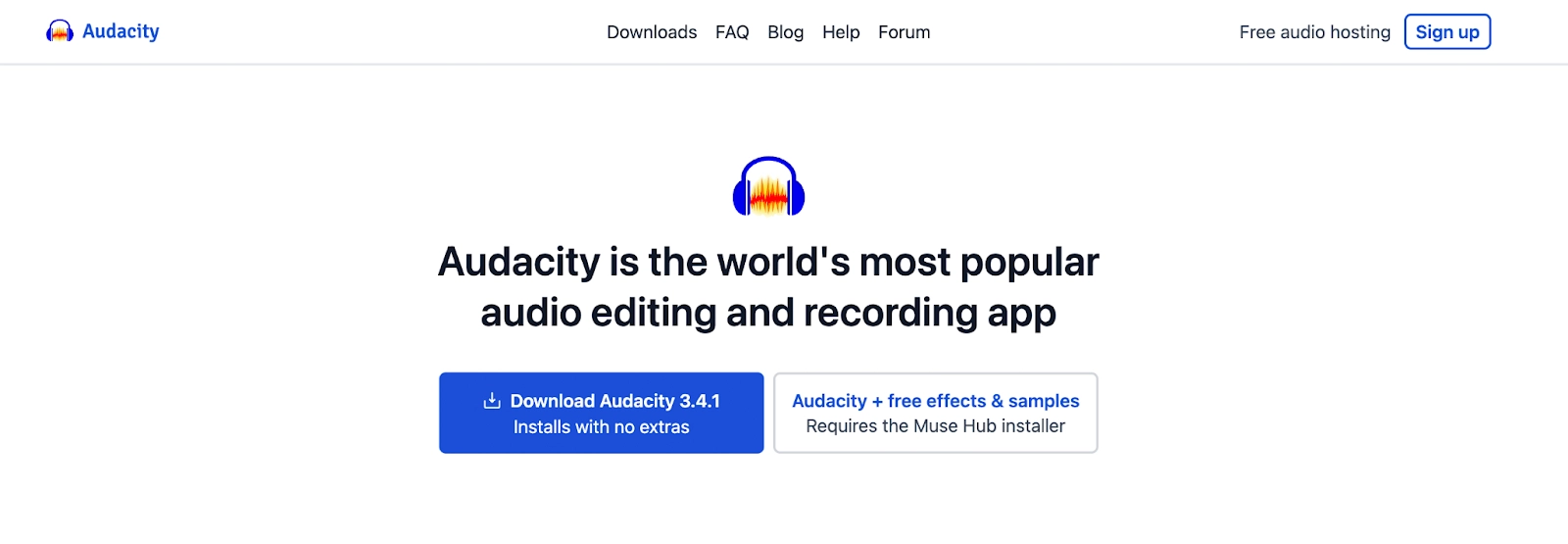 |
Audacity is a digital audio workstation (DAW) that offers tools to both record and edit your podcast. It’s one of the legacy options—Audacity first launched in 2000—and the outdated interface shows. But because it’s an open-source audio tool, with some patience, you can customize it using plugins and integrations to build a tool that’s right for you.
Advantages and standout features:
- Free podcast recording tool
- Record live audio, computer playback, or import audio files for editing
- Comes with a range of built-in plug-ins and effects to customize your own dashboard
- Available on Windows, MacOS, and Linux
- Rated 4.5 out of 5 stars on G2
Disadvantages of Audacity’s podcast recording software:
- The interface is outdated
- No option to publish or share audio after editing—only export
Pricing: Free.
4. [Removed Listing]
This option has been removed from our list.
Best for: Creators who want to record podcasts and music on a Mac device.
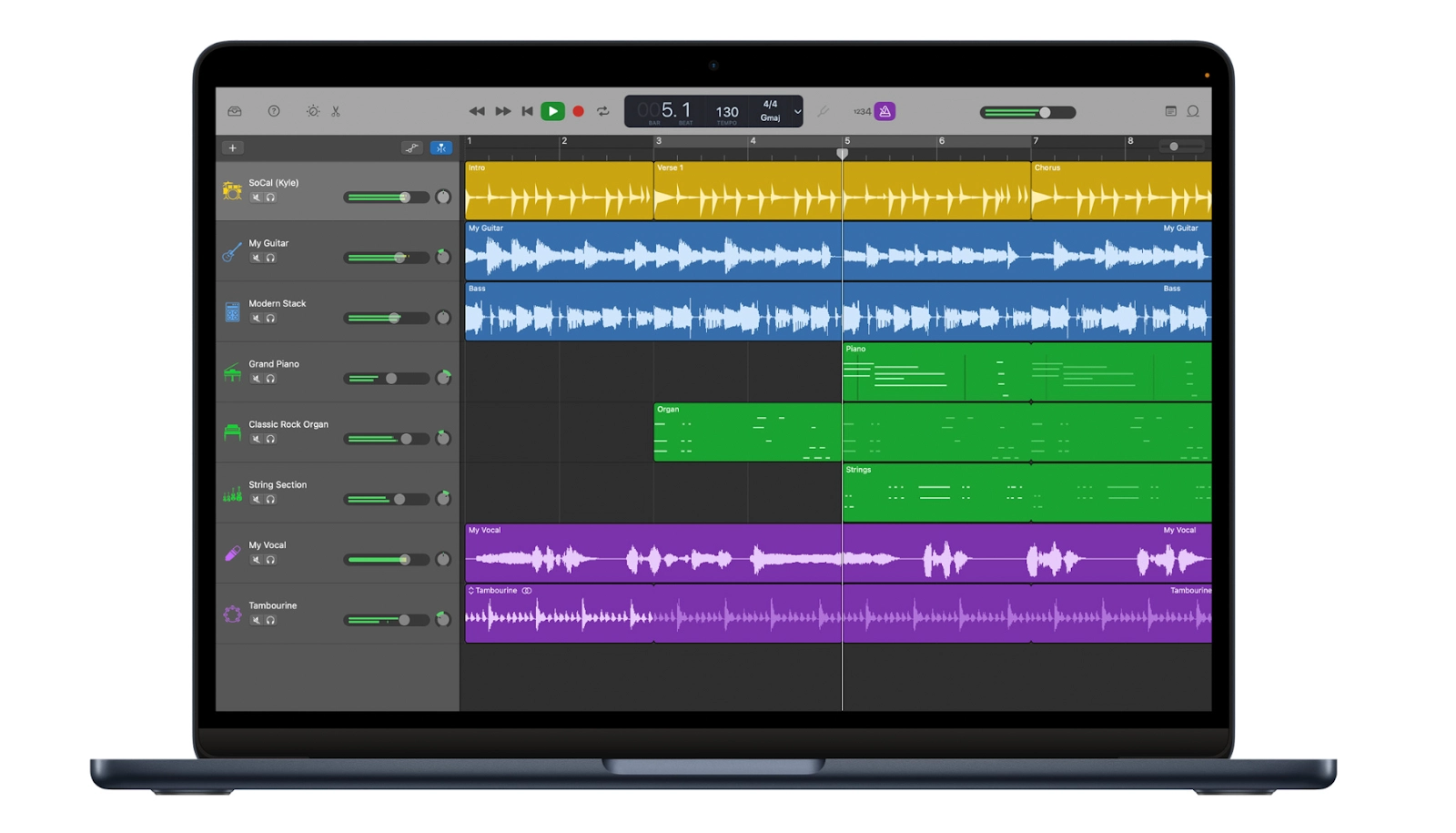 |
Looking for a podcast tool that allows you to record different types of audio on iOS or OS X? If you’re a podcaster that creates original music to include in your intro and outro, for example, GarageBand is a great option. It’s free—but only available to those using a Mac device.
Advantages and standout features:
- Comes free as standard on all iPhones, iPads, and Macs
- Simple, easy-to-use interface ideal for beginner podcasters
- Record any type of audio from vocals to musical instruments
- Editing features within the same podcast recording dashboard
- Rated 4.3 out of 5 stars on G2
Disadvantages of GarageBand’s podcast recording software:
- Primary focus is music production, not podcasting
- Only available on Mac devices
Pricing: Free.
5. REAPER
Best for: Podcasters looking to record their show with incredible audio quality.
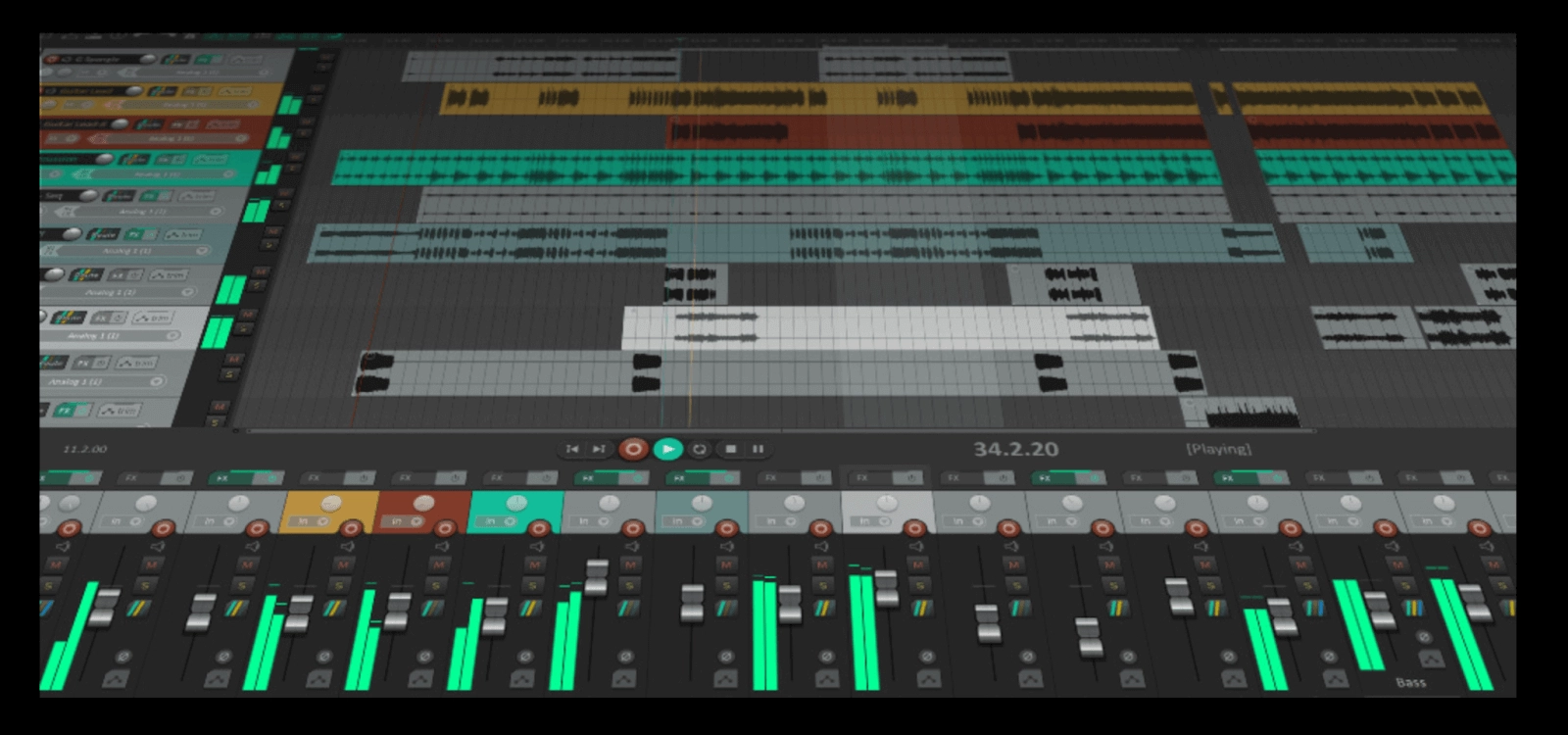 |
REAPER is a DAW that allows creators to record unlimited audio tracks. Use the tool to record music, vocals, and sound effects you can use to engage listeners. It offers 64-bit internal audio processing for high-quality sound, but the interface does have a steep learning curve if you’re not already familiar with audio editing software options.
Advantages and standout features:
- Multitrack audio and MIDI recording on separate tracks
- Low-cost licensing options to get high-quality software for a lower price
- Option to create keyboard shortcuts that you can use while recording
- Supportive community to get the most value from your podcast recording software
- Rated 4.4 out of 5 stars on G2
Disadvantages of REAPER’s podcast recording software:
- Extensive customization features might be overwhelming for new podcasters
- No iOS or Android mobile app for on-the-go podcast recording
Pricing: The REAPER license is $60 for individual creators or $225 for commercial use. There is a 60-day free trial on offer. All plans come with free lifetime updates.
6. Zoom
Best for: Creators who are familiar with Zoom and want to record on mobile.
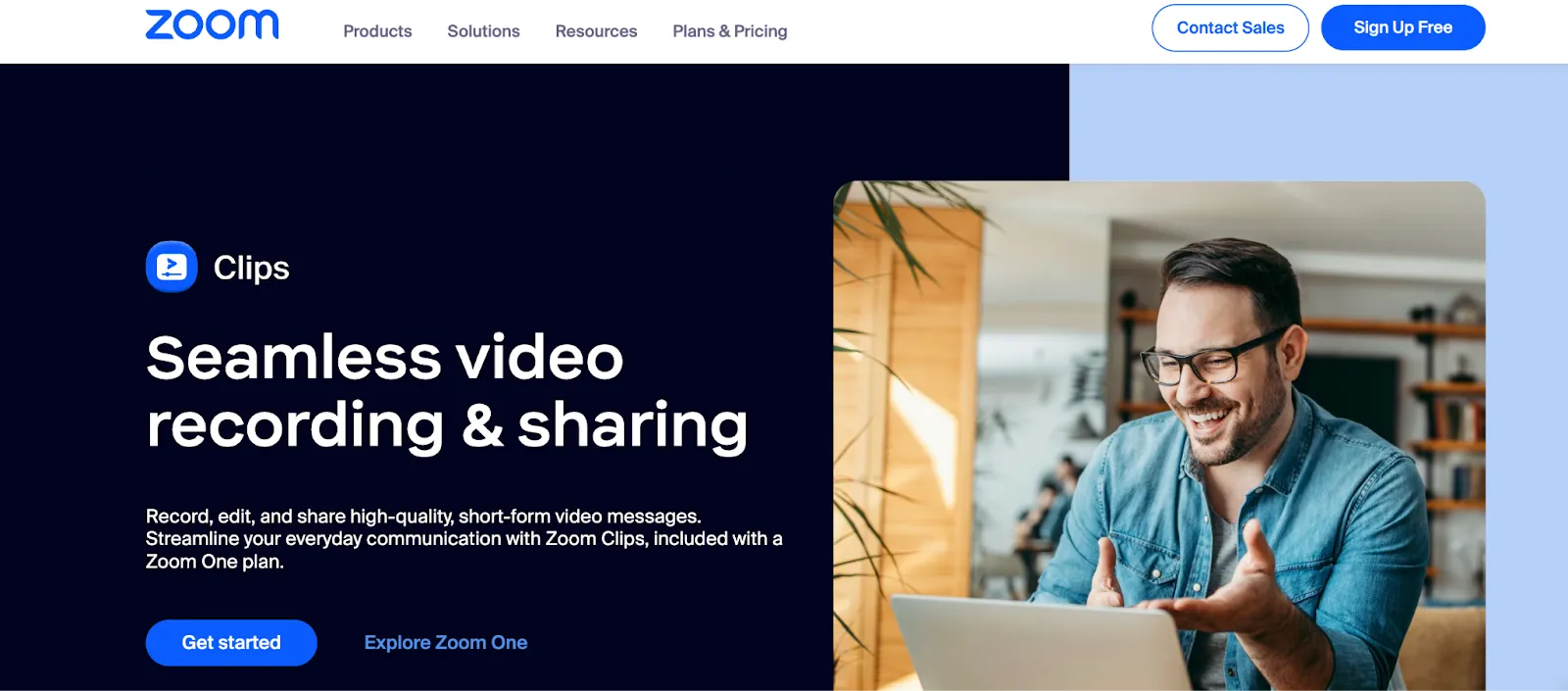 |
If you’ve ever worked remotely, there’s a good chance that you’ve used Zoom. Similar to other VoIP platforms like Skype, Zoom is primarily a video conferencing tool but offers audio recording features, which is why some creators rely on the software to record their podcasts.
Advantages and standout features:
- Record your webcam or screen alongside audio to create a video podcast
- Live streaming capabilities to broadcast in real-time and save the recording for later
- Cloud recording or local recording options
- Mobile (iOS and Android), desktop, and browser functionality to record podcasts on any device
- Rated 4.5 out of 5 stars on G2
Disadvantages of Zoom’s podcast recording software:
- Zoom has been criticized for its poor security
- No editing features baked in—you’ll need to find a separate podcast editing software
- Sound quality is dependent on network stability and can result in glitchy audio
- You can’t use it to record podcasts offline
Pricing: Zoom has a free version but recordings are limited to 40 minutes. Paid plans to remove this time restriction start at $149.90 per year.
7. Logic Pro
Best for: Experienced podcasters using an Apple device to record podcasts.
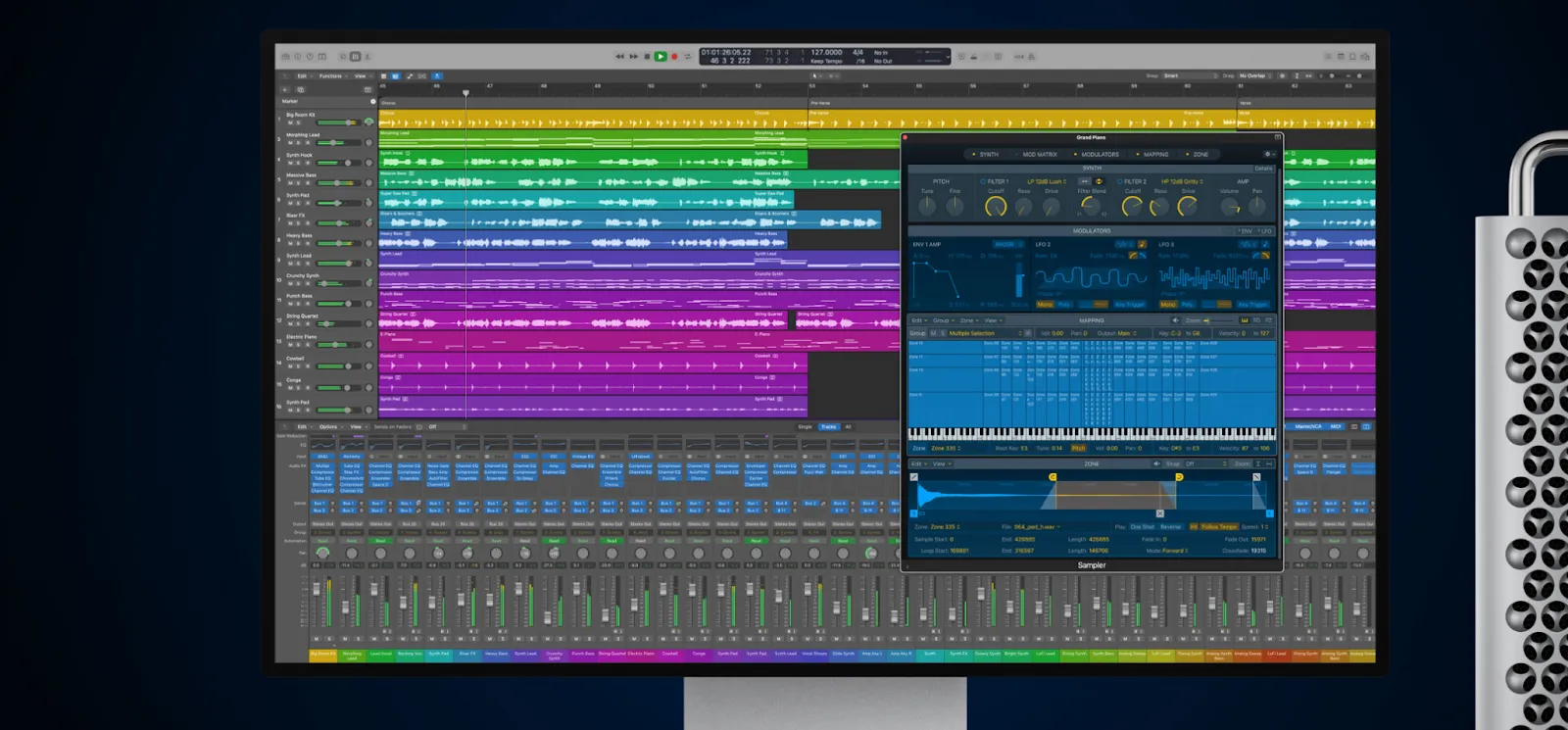 |
Logic Pro is Apple's audio editing software. It’s a step above GarageBand and designed for experienced sound engineers. Add it to your shortlist if you’re looking for podcast recording software that’s packed with professional features to help you record and edit a chart-topping podcast.
Advantages and standout features:
- The interface is sleek, smart, and modern
- Unlimited audio tracks to record as many layers as you wish
- Smart Tempo feature to sync audio recordings with different rhythms
- Export your recording as a Dolby Atmos file (compatible with Apple Podcasts)
- Rated 4.6 out of 5 stars on G2
Disadvantages of Logic Pro’s podcast recording software:
- Only available on Mac devices
- Designed for professionals, so newbies may find the interface difficult to navigate
Pricing: One-time fee of $199.
8. SquadCast
Best for: Creators who want to record audio and video remotely in 4K quality.
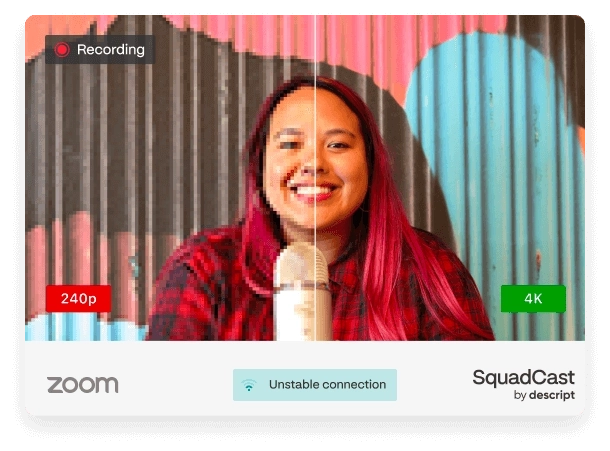 |
SquadCast is a remote recording studio that allows podcasters to record both audio and video. It was recently acquired by Descript and is included in every plan, but the best part about Squadcast is that it records 4K video and audio files to your computer. If you have a podcast guest and their internet drops out, the recording won’t be affected (or worse: lost entirely).
Advantages and standout features:
- Incredibly easy to use
- Mobile app available for on-the-go podcast recording
- Podcast guests don’t have to download special software to join your recording session
- Audio and video is recorded locally on everyone’s computer so you won't lose the recording if your internet drops out unexpectedly
- Your podcast recording will automatically be added to Descript, ready to start editing
Disadvantages of Squadcast’s podcast recording software:
- Free plan is limited to one hour of recording per month
- You’ll need an active internet connection to record
Pricing: Included in all Descript plans—including the free tier.
9. Alitu
Best for: Web-based podcast recording for creators with guests or co-hosts.
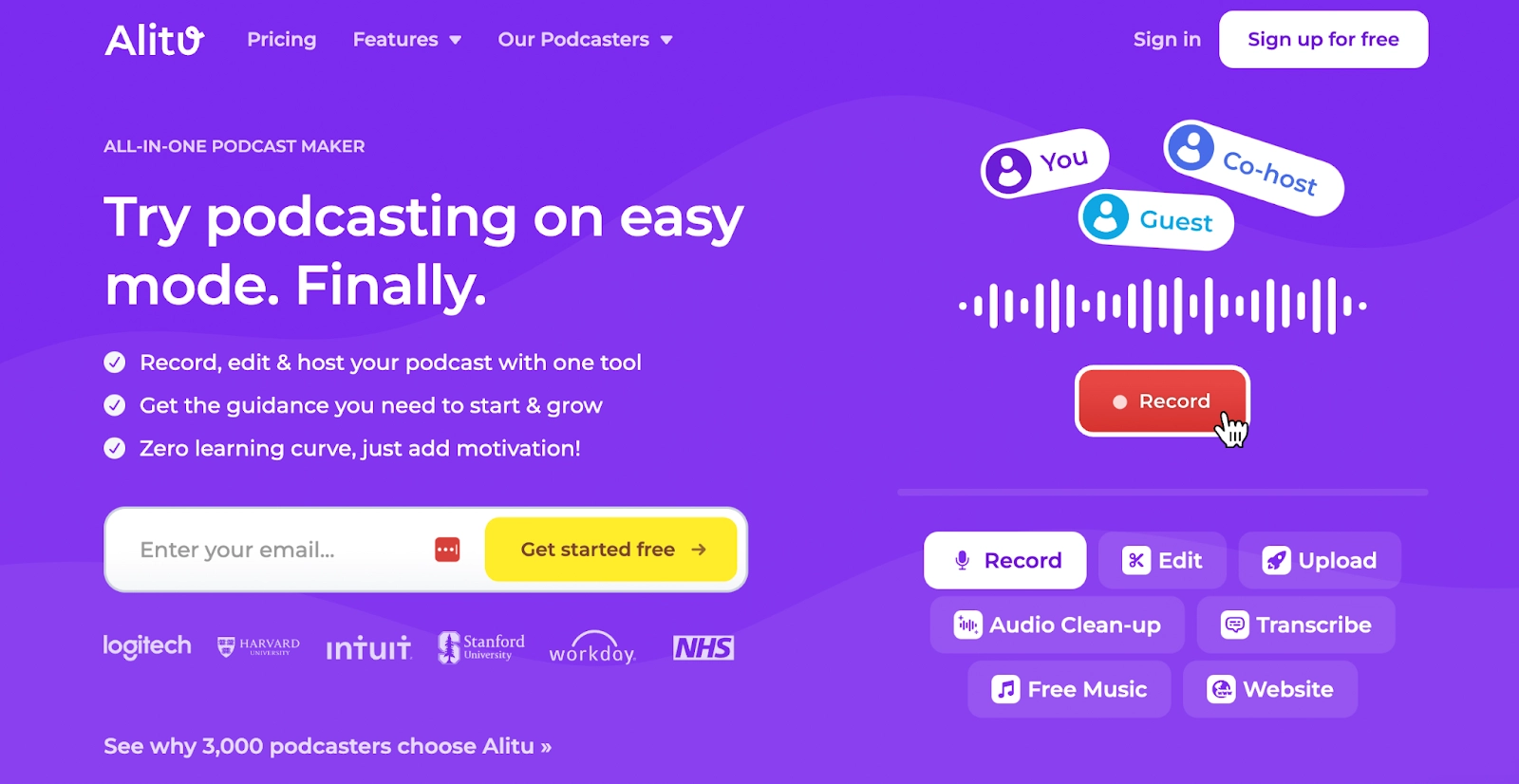 |
Alitu is a podcast suite that allows you to invite podcast guests or co-hosts to your recording session. It’s designed for beginners and incredibly easy to use. You’ll also get a bunch of other features—like transcription, royalty-free music, and podcast hosting—included as standard.
Advantages and standout features:
- Branded virtual studio to record your podcast
- Chat feature to message your fellow hosts without interrupting the audio recording
- Scheduling tool to arrange a date and time with your podcast guests
- The file is pre-populated into the audio editor to save time in post-production
- Option to add podcast hosting
Disadvantages of Alitu’s podcast recording software:
- No option to record video
- Lacks professional-grade recording features
- Alitu is web-based, so you need a strong internet connection to record your podcast
Pricing: $38 per month. There is a 7-day free trial available.
10. Riverside
Best for: Remote podcast recording with a small number of guests.
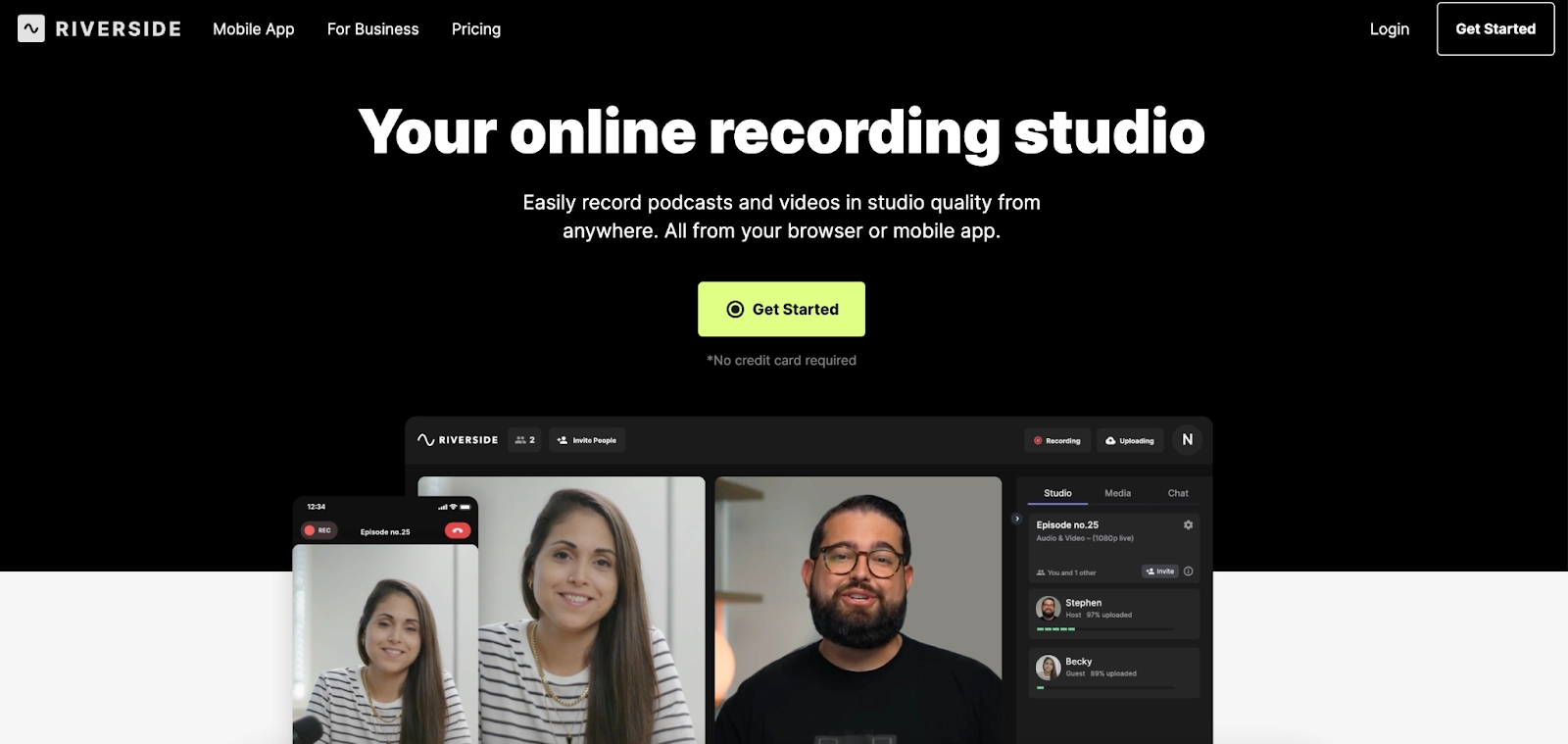 |
If you’re looking to record video and audio for your podcast, Riverside.fm is a good option. It helps creators record remote interviews for their show. All files are in superb quality, which makes for a pleasant listening (or viewing) experience. The biggest caveat is that you’re limited to eight participants.
Advantages and best features:
- Free plan available
- Record 48kHz WAV audio locally on your device
- Mobile app to record your podcast from anywhere
- Loudness meter to make sure one guest isn’t uncomfortably louder than the rest
Disadvantages of Riverside’s podcast recording software:
- Limited to seven guests per recording (plus yourself)
- Editing features aren’t superior; you’ll likely need another tool to edit your show
Pricing: Riverside’s free plan gives you two hours of recording each month. For more hours, paid plans start at $15 per month.
11. Zencastr
Best for: Recording a podcast with live sound effects.
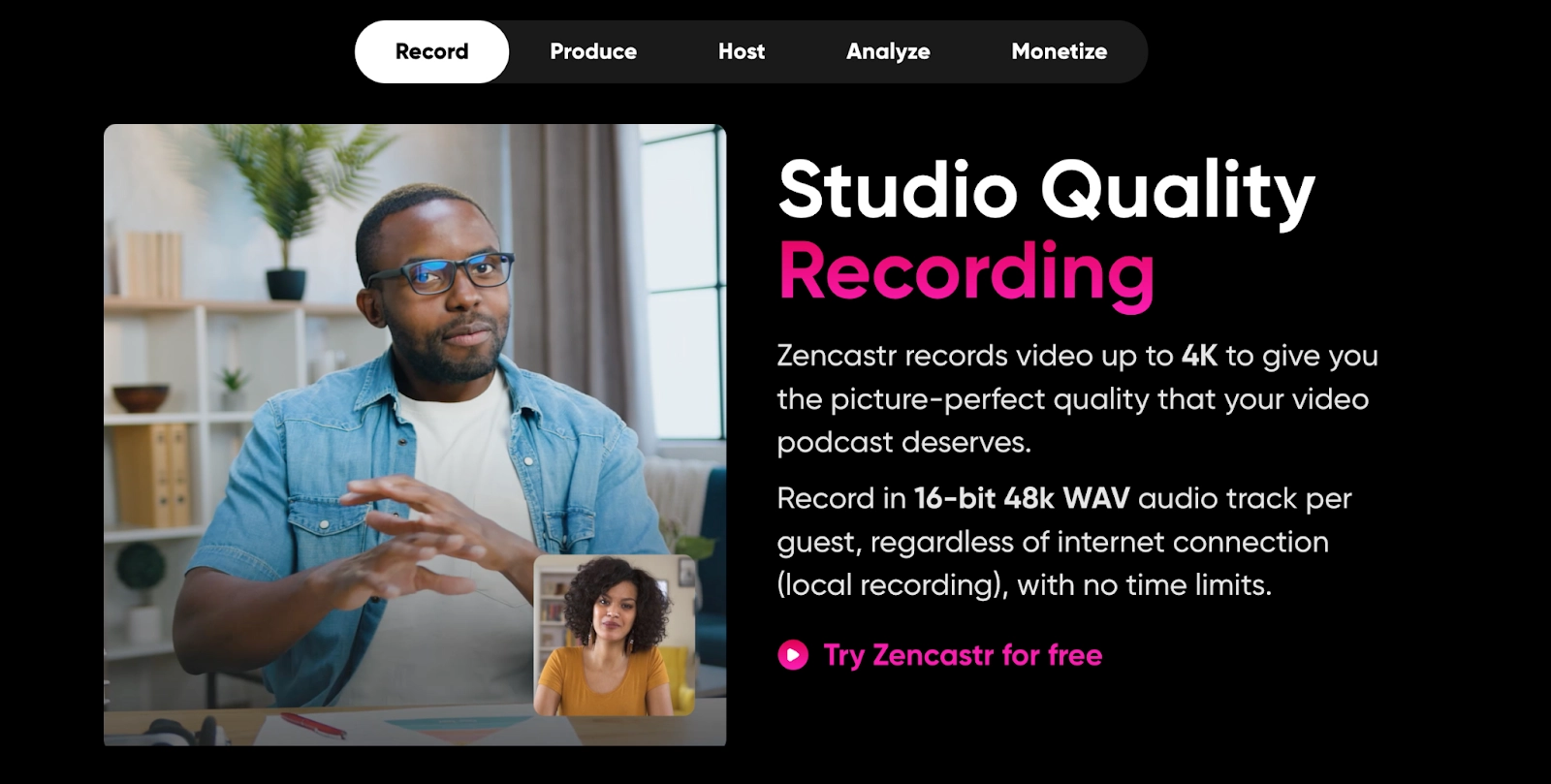 |
Zencastr is designed to be an all-in-one podcast recording suite for creators. Its most attractive feature is the Creator Network—a way to monetize your show through podcast ads and sponsorships that are managed by Zencastr themselves.
Advantages and standout features:
- Creator Network helps monetize your show without securing sponsorships yourself
- Mobile app available for recording a podcast on the go
- Record a video podcast in up to 4K quality
- Local recording to save backups of each episode to the cloud
- Live soundboard to insert audio clips as you record
Disadvantages of Zencastr’s podcast recording software:
- Rated 3.6 out of 5 stars on G2
- Some users report that the recording platform is unstable
- More expensive than other podcast recording tools
Pricing: Plans start at $18 per month. This includes unlimited audio and video recording but has a limit of 10 post-production credits each month.
How to find the best podcast recording software
Before you commit to the first podcast recording software you find, think about these five things.
Compatibility
Some podcast recording tools are limited to a specific device. If you don’t have access to a computer, for example, you’ll need to check if the software is accessible on a mobile device—either through a native app or a mobile browser.
Similarly, if there’s a desktop version of the software on your shortlist, check that it works with your operating system. GarageBand, for example, is limited to Mac users, whereas Descript works on both Mac and Windows.
Recording features
There’s more to recording a podcast than hitting the big red “record” button and talking through your podcast script.
If you’re hosting a show with a co-host or conducting interviews, you’ll need a tool that offers multi-track recording. If you want to distribute your show in video format, you’ll need something that supports video. You’ll want it to look and sound good, which means tools that help you improve the sound quality and video quality.
Ease of use
If you don’t have much experience with podcasting or just don’t want to spend hours figuring out a new tool, shortlist podcast recording software that has a user-friendly and intuitive interface. Many beginner-friendly options have tutorials, templates, and prebuilt workflows to get you up to speed.
Pricing and licensing
Recording your show is only one part of the podcast production workflow. It can get expensive when you factor in the cost of podcast equipment, editing software, and a hosting platform. Creators who are on a budget—or haven’t dived into monetization yet—often look for free versions of the best recording software.
Audio quality
The last thing you want to do is invest in an expensive microphone and treat your space to limit background noise only to have your audio distorted when the podcast recording software compresses your file. Look for a recording tool that allows you to record high-quality podcast audio.
🎧 Continue learning: Elevate your audio with equalization and compression
Other podcast recording tools you might need
Calendar and scheduling software
Time management is key as a podcaster, especially if you’re inviting guests or recording your show with a co-host. Tools exist to remove the administrative workload of scheduling.
With Calendly, for example, you can present your availability with a shareable link. Guests can see the available time slots and choose one that’s mutually available. Once they book, the event details will appear on both of your Google Calendars (provided you’ve configured that integration in your Calendly account).
Podcast hosting platform
A podcast hosting platform is the virtual home for your show. It’s where you’ll store your audio file alongside any show details like your podcast name, description, and cover art. Popular options include Buzzsprout, Transistor, and Podbean.
Your hosting service will also create an RSS feed link for your show. This is how you’ll publish your podcast to directories like Spotify, Google Podcasts, Stitcher, and Apple Podcasts.
Website hosting and site builders
A podcast hosting platform hosts your episode, but a standalone branded website can add another layer of professionalism to your show. Serving as a central hub for your audience to discover new episodes and read your show notes, most website hosting companies offer site builders to get your podcast website up and running quickly.
Social media content scheduler
Most podcast hosting platforms lack the community features that help a podcast thrive. It’s why creators turn to social media to market their show (and encourage podcast guests to do the same).
The best promotion is continuous, so lean on social media scheduling tools like Sprout Social, Buffer, and Hootsuite to push out a steady stream of posts that promote your latest episodes. It’ll save you from mental reminders to promote your podcast.
⚡️ Pro tip: Use Descript’s AI features to streamline your podcast promotion strategy. Use Find Good Clips to find clip worthy moments from your show, and write automated captions when posting them using Social Post Writer.
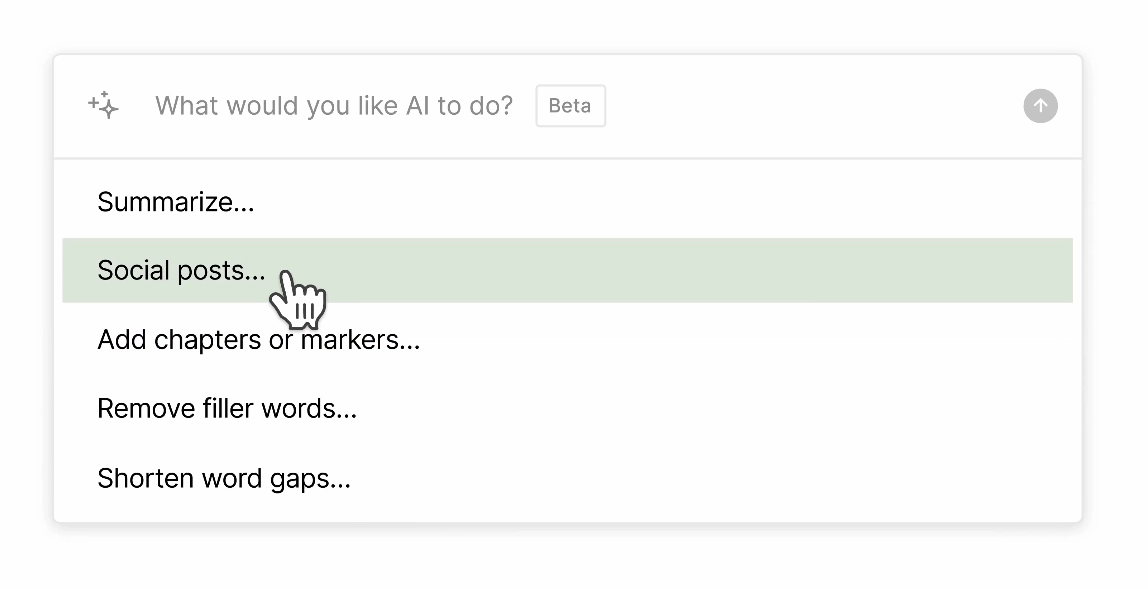 |
Podcast recording software FAQs
What is the best program to record a podcast?
- Descript: best for recording and editing
- SquadCast: best for remote recording audio and video
- GarageBand: best for recording podcasts and music on Mac
- Logic Pro: best advanced recording software for Mac
- Adobe Audition: best for creators using the Adobe Creative Cloud
Can I record a podcast on my PC?
Anyone can record a podcast on their PC. Launch the free Descript app for Mac and Windows, then start recording your show with your PC’s microphone.
Can I record a podcast for free?
You don’t need money to record a podcast. With free podcast recording tools like Descript and SquadCast, you can invite guests and record a high-quality show for free.
What do podcasters use to record audio?
Podcasters use a lot of different software to record audio. Some of the most popular are Descript, Audacity, and Adobe Audition.
Is Audacity or GarageBand better for podcasts?
Audacity and GarageBand are both good, free options for creators who want to record a podcast. However, GarageBand is only available for Mac and Audacity has a steep learning curve. Because of that, we recommend Descript.
Frequently asked questions
How long can I record in Descript?
You can record up to 3 hours on Windows and 4 hours on macOS with Quick recorder. The Editor recorder supports up to 4 hours of recording on both operating systems, so you can plan long sessions without worrying about hitting a time limit.
How do I get reliable audio when recording remote guests?
Encourage each person to wear wired headphones, close unneeded apps, and stay in the recording tab. Tools like SquadCast and Descript help capture each guest’s audio locally, which minimizes glitches if someone’s internet dips.






















